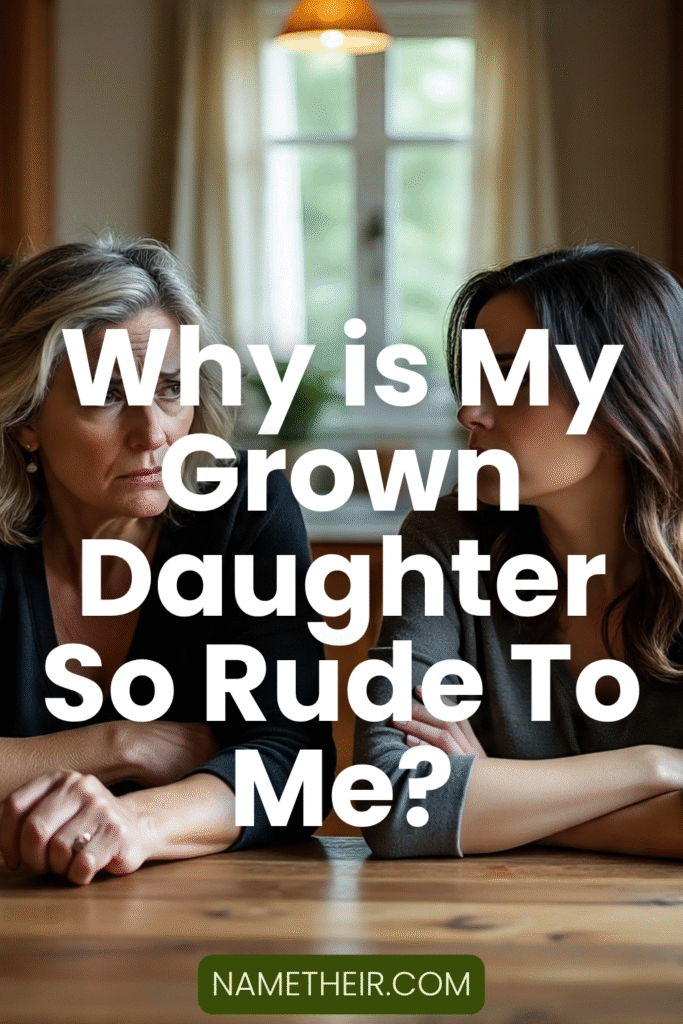Why Is My Grown Daughter So Rude to Me? Understanding the Shift and Healing the Relationship
Parenting doesn’t stop when our children turn 18. In fact, as your daughter becomes an adult, the dynamic often shifts in ways that can be confusing, painful, and even confrontational. If you find yourself wondering, “Why is my grown daughter so rude to me?”—you’re not alone.
Many parents experience a sudden or gradual change in their adult child’s tone, behavior, or level of respect. It’s emotionally draining to raise someone with love only to feel hurt by their words or indifference later. But while this can be one of the most painful transitions, it can also be one of the most enlightening if approached with compassion, introspection, and clarity.
Let’s dive deep into the reasons behind this behavioral shift, what it could mean, and how you can respond to rebuild a healthier, more respectful bond.

Table of Contents
Common Reasons Why Your Grown Daughter Might Be Rude
1. Unresolved Childhood Issues
Sometimes, what appears to be “rudeness” is actually lingering resentment or emotional wounds from childhood. Your daughter might feel unheard, neglected, overly controlled, or criticized during her upbringing, and those unresolved feelings may surface in adulthood as sarcasm, anger, or emotional distance.
💡 What You Can Do: Instead of dismissing her behavior as simply rude, try asking open-ended questions like, “Have I done something to make you feel disrespected or unheard?” This opens the door to honest dialogue without placing blame.
2. Struggles for Independence
Your daughter may still be carving out her adult identity. In that process, she may see you as a symbol of the control or structure she’s trying to escape. Rudeness can sometimes be a defense mechanism to reinforce her independence—even if it’s hurtful.
💡 What You Can Do: Give her space. Avoid unsolicited advice and let her make her own decisions—even if they lead to mistakes. Respecting her autonomy can help her feel more like an equal and less like a child under scrutiny.
3. Generational Communication Gaps
Today’s generation communicates very differently from how many parents were raised. What you see as disrespect (e.g., abrupt texts, lack of pleasantries, or sarcasm) might be part of her everyday communication style. That doesn’t make it acceptable—but it does make it explainable.
💡 What You Can Do: Express how certain words or tones affect you. Try saying, “When you speak to me like that, I feel hurt. Can we try to talk to each other with more kindness?” Being vulnerable, not accusatory, fosters empathy.
4. Stress and Mental Health Struggles
Adulthood is full of challenges—careers, finances, relationships, and even motherhood. If your daughter is going through anxiety, depression, or burnout, she might be less patient and more emotionally reactive, especially with those closest to her.
💡 What You Can Do: Don’t take it personally. Gently ask if she’s okay. Say something like, “You seem overwhelmed lately—want to talk about it?” Showing support rather than judgment can shift her defensiveness into openness.
5. Role Reversal: When the Parent Needs Parenting
As parents age, the dynamic can shift. You may start needing help with health, technology, or other life aspects. Some daughters feel unprepared for this reversal and may lash out due to fear, pressure, or emotional overload.
💡 What You Can Do: Acknowledge the shift. Assure her that you value her support but also want to maintain mutual respect. Balance vulnerability with strength.
The Emotional Toll: How It Feels When Your Daughter Turns Cold
Hearing cold responses, passive-aggressive comments, or blatant disrespect from your own child can feel like a betrayal. You might find yourself crying in silence, asking:
- Where did I go wrong?
- Does she even love me anymore?
- Is this permanent?
It’s okay to feel pain, confusion, or even guilt. But instead of burying these feelings, acknowledge them. Ignoring emotional wounds only deepens them. You deserve to be respected—even by your adult children.
How to Respond When Your Grown Daughter Is Rude
Here are practical, emotionally intelligent steps you can take:
1. Set Boundaries, Lovingly
Boundaries aren’t ultimatums; they’re expressions of self-respect. For instance: “I want to stay close with you, but I can’t continue conversations when I’m being yelled at. Let’s talk later when we’re both calm.”
2. Don’t Retaliate
Rudeness doesn’t justify more rudeness. Responding with sarcasm, guilt-tripping, or shouting only escalates the issue. Be the emotional anchor. If needed, walk away and return to the conversation later.
3. Engage in Honest Conversations
Pick a calm time to express how you feel—not to scold, but to share. Use “I” statements: “I feel hurt when I’m spoken to that way because I love you and want a kind relationship.”
4. Seek Family Counseling
If the relationship is severely strained, therapy can be transformative. A neutral third party can help you both unpack years of misunderstandings and foster healing.
5. Reflect on Your Parenting—But Don’t Self-Blame
No parent is perfect. But while self-reflection is healthy, endless self-blame is not. If you did make mistakes, acknowledge them, apologize sincerely, and focus on how to do better now.
What Not to Do When Your Daughter Is Rude
- ❌ Don’t guilt-trip her with “After all I’ve done for you…”
- ❌ Don’t gossip about her to other family members.
- ❌ Don’t cut her off unless it’s toxic beyond repair.
- ❌ Don’t try to “parent” her like a teenager.
- ❌ Don’t assume it’s all your fault.
When the Relationship Becomes Toxic
Sometimes, the behavior goes beyond occasional rudeness and becomes emotionally abusive. If your daughter constantly demeans you, manipulates you, or causes you anxiety, it might be time to reconsider your role in her life.
Ask yourself:
- Is this relationship affecting my mental health?
- Does she make me feel small or unwanted?
- Have my boundaries been ignored repeatedly?
If yes, seeking support from a therapist or counselor is essential. In rare cases, going low-contact or no-contact may be necessary for your well-being. Remember: You’re still a person who deserves love, peace, and respect.
Rebuilding the Relationship: There Is Hope
Many parent-child relationships go through rocky phases, especially in early adulthood. With time, maturity, and open communication, relationships can often be rebuilt even after years of distance or pain.
Here’s what can help:
- 🧩 Write a Letter: Sometimes a written message allows for reflection without confrontation.
- 🧩 Start Fresh: Suggest doing something together without talking about heavy issues—like cooking, traveling, or watching a movie.
- 🧩 Practice Forgiveness: Forgiving doesn’t mean forgetting—but it frees you from carrying resentment.
Final Thoughts: Healing Begins With Understanding
If you’re asking, “Why is my grown daughter so rude to me?”—you’re already on the path to healing. That question shows a desire to understand rather than punish, and that’s powerful.
Rudeness from a grown child can stem from many places: pain, fear, stress, or immaturity. While you can’t control her reactions, you can control your own responses—with empathy, courage, and strength.
Stay open. Be kind to yourself. And remember—relationships can heal when both sides are willing to do the work.






